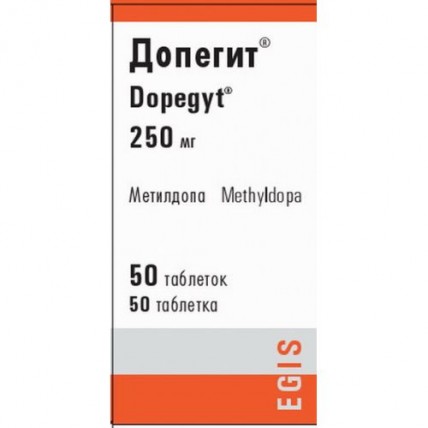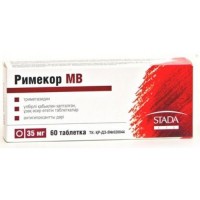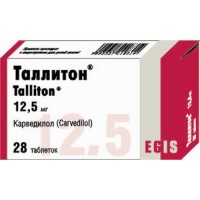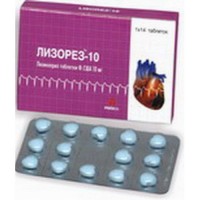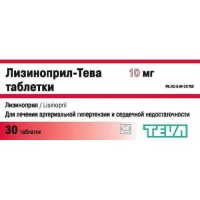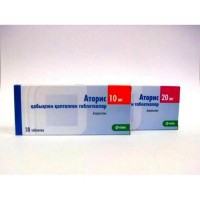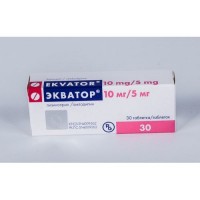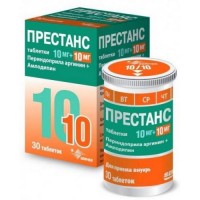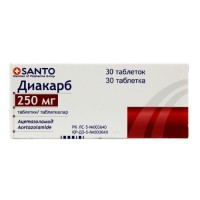The instruction for medical use
of DOPEGITâ medicine
the Trade name
of Dopegitâ
the International unlicensed name
of Methyldopum
the Dosage form
of the Tablet of 250 mg
Structure
One tablet contains
active agent - Methyldopum of anhydrous 250 mg (it is equivalent Methyldopums of sexivihydrat of 282 mg),
excipients: corn starch, ethyl cellulose, talc, sodium of starch glikolit (type A), stearic acid, magnesium stearate.
The description
White or grayish-white round flat tablets with a facet, on one party smooth, on other party with DOPEGYT engraving, without or almost flavourless.
Pharmacotherapeutic group
Hypotensive drugs. Adrenostimulyatora central. Methyldopum (left-handed).
The ATX C02A B01 code
the Pharmacological
Pharmacokinetics Absorption properties Methyldopums from digestive tract non-constantly. After intake the bioavailability is 25%. The maximum concentration in plasma is reached in 2-3 hours. Linking with proteins of blood plasma - less than 20%. The place of the main and intensive metabolism Methyldopums - a liver. The active metabolite of drug - alpha methylnoradrenaline - comes from the central adrenergic neurons. Besides, many other metabolites excreted with urine are known.
About 2/3 Methyldopums are removed with urine in a look Methyldopums or a sulphatic conjugate, and other quantity is removed with a stake in an invariable look. Removal has two-phase character. At normal function of kidneys the elimination half-life is equal 1.8 ± 0.2 hours. Active component of drug is completely removed from an organism within 36 hours.
Methyldopum it is removed at a hemodialysis. The six-hour hemodialysis can bring out of the circulating blood 60% of the soaked-up dose Methyldopums, and peritoneal dialysis within 20 - 30 hours removes about 22 - 39%.
Methyldopum gets through a placental barrier and it is allocated in breast milk.
The maximum lowering of arterial pressure occurs in 4 - 6 hours after reception of one dose inside and 12 - 24 hours last.
After repeated reception the maximum hypotensive effect develops within 2 - 3 days. After drug withdrawal of the ABP returns to initial level within 1 - 2 days.
In a renal failure the removal Methyldopums slows down according to extent of depression of function of kidneys. At heavy disturbance (without hemodialysis) elimination half-life Methyldopums is extended by 10 times.
The pharmacodynamics
Active agent of drug - Methyldopum - is antihypertensive drug of the central action. The mechanism of its action completely is still unknown now. The active metabolite (α-methylnoradrenaline) which is formed in the central nervous system stimulates central brake presynaptic α2-адренорецеторы, reducing a sympathetic tone, substitutes as a false neurotransmitter an endogenous dopamine in dopaminergic nerve terminations, reduces activity of renin of plasma and reduces resistance of peripheral vessels, suppresses enzyme a dopa-decarboxylase, thereby reducing synthesis of noradrenaline, dopamine, serotonin and concentration of noradrenaline and adrenaline in fabrics.
Dopegit has no direct impact on function of heart, does not reduce the minute volume of blood, does not cause reflex tachycardia and also does not reduce the glomerular filtration rate, a renal blood stream, the filtered fraction. In certain cases heart rate decreases. Drug reduces arterial blood pressure at position of the patient both lying, and standing and only in rare instances causes orthostatic hypotension.
Indications
- arterial hypertension
the Route of administration and doses
of the Tablet for intake. A pill can be taken to or after a meal.
The recommended initial dose - 250 mg 2-3 times a day during the first two days. Then the daily dose can be raised or reduced, depending on degree of a lowering of arterial pressure, with two-day intervals. For reduction of expressiveness of the sedation possible at the beginning of a course of treatment and at increase in a dose, at first increase an evening dose. A maintenance dose - 500-2000mg 2-4 times a day.
At insufficient efficiency of drug in a dose 2g/days it is recommended to apply a combination with other antihypertensive drugs.
After 1 - 3 months of treatment the tolerance can develop. Effective control of arterial blood pressure it is possible to restore addition of diuretic or increase in a dose Methyldopums.
After Dopegit's cancellation arterial blood pressure is established on initial level in 48 hours without the phenomenon of the return influence.
Dopegit it can be applied and at patients who already take other antihypertensive drugs, gradually canceling the previous drug. In such cases the recommended initial dose makes 500 mg a day. For achievement of desirable therapeutic effect the dose can be raised with intervals at least in two days.
If Dopegit is used as addition to the begun antihypertensive therapy, then it is possible, it will be necessary to change a dose of antihypertensive drug that transition to combination therapy took place without complications.
At patients of advanced age the initial dose has to be lower and not exceed 500mg/days. If necessary it is possible to raise a dose gradually each 2 days to the maximum dose 2g/days which cannot be exceeded.
More often the syncopal states (loss of consciousness) observed at elderly patients probably connected with hypersensitivity of elderly patients and with the significant narrowing of a gleam of blood vessels, it is possible to avoid, using lower doses.
In a renal failure it is necessary to apply reduced doses. In a renal failure of light severity (glomerular filtration rate of SKF & gt, 50 ml/min.) it is necessary to maintain an interval between receptions of 8 hours, in a renal failure of moderate severity (SKF = 10-50 ml/min.) with an interval of 8-12 hours, and in a renal failure of heavy degree (SKF & lt, 10 ml/min.) 12 - 24 hours.
As Methyldopum is removed at a hemodialysis, after this procedure the patient should appoint an additional dose of 250 mg in order to avoid increase in arterial blood pressure.
Children and teenagers aged up to 18 years
the Recommended initial dose at children makes 10 mg/kg of body weight a day for 2 - 4 receptions. If necessary the daily dose can be raised gradually (to 65 mg/kg of body weight) with intervals not less than two days. The daily dose should not exceed 3000 mg.
The dose of drug and duration of treatment is defined by the doctor individually depending on a clinical condition of the patient.
Side effects
Very often (≥ 1/10)
- positive test
of Koombs Redko (≥ 1/10,000 and & lt, 1/1000)
- hemolytic anemia, a leukopenia, a granulocytopenia, thrombocytopenia
Very seldom (& lt, 1/10,000)
- myocarditis, a pericarditis
- parkinsonism
-
- pancreatitis
- hepatitis, necrosis of a liver
does not know strengthening of stenocardia (frequency cannot be estimated on the basis of the available data)
- oppression of marrow, positive test for anti-nuclear antibodies, LE cells, a rheumatoid factor
- a giperprolaktinemiya, a gynecomastia, a galactorrhoea, an amenorrhea
- dreadful dreams, usually not profound, passing psychosis or a depression, decrease in a libido
- peripheral paresis of a facial nerve, slackness, involuntary horeoatetozny movements, symptoms of insufficiency of cerebral circulation (perhaps, connected with hypotension), a headache, a sedation (usually passing), apathy, weakness, dizziness, paresthesia
- stagnant heart failure, sinus bradycardia, hypostases, increase in body weight. Swell and increase in body weight usually well respond to treatment by diuretics. If hypostases become more expressed and also at emergence of symptoms of heart failure the drug treatment should be cancelled
- increase in sensitivity of a carotid sine, orthostatic hypotension (at the same time lowering of a dose is recommended)
- congestion of a nose
- colitis, vomiting, inflammation of sialadens, morbidity or blackening of language, nausea, a constipation, a meteorism, dryness in a mouth
- a cholestasia, jaundice, disturbances of functional trials of a liver
- a toxic epidermal necrolysis, eczema, lichenoid rashes
- impotence, disturbances of an ejaculation
- increase in residual nitrogen of blood
of the Contraindication
- hypersensitivity to active or to other components of drug
- an abnormal liver function, Methyldopums connected with the previous use
- an active stage of a disease of a liver (active hepatitis or active cirrhosis)
- the accompanying therapy by monoaminooxidase inhibitors
- a depression
- a pheochromocytoma
- children's age up to 18 years.
Medicinal interactions
of Dopegit cannot be applied along with monoaminooxidase inhibitors.
Simultaneous use with the following drugs demands extra care:
· The drugs reducing hypotensive effect of the drug Dopegit:
- sympathomimetics
- tricyclic antidepressants
- fenotiazina (at the same time also the additive hypotensive effect is possible) - oral iron preparations (sulfate and a gluconate of iron/II) (Methyldopums can reduce bioavailability)
- non-steroidal anti-inflammatory drugs
- estrogenic drugs
· The drugs enhancing hypotensive effect of the drug Dopegit:
- other antihypertensive drugs (summation of hypotensive effects is possible)
- anesthetics
of Dopegit and the following drugs can change effects of each other:
- lithium drugs (development of intoxication by lithium)
- a levodopa (decrease in protivoparkinsonichesky action and strengthening of undesirable action on the central nervous system)
- the ethanol and other drugs oppressing the central nervous system (strengthening of oppression of the central nervous system)
- anticoagulants (strengthening of anticoagulating effect, danger of bleeding)
- Bromocriptinum (perhaps undesirable influence on concentration of prolactin) is possible
- a haloperidol (disturbance of cognitive functions - a disorientation and confusion of consciousness is possible).
Special instructions
in the course of treatment by the drugs containing to Methyldopum hemolytic anemia in rare instances can develop. At development of the symptoms indicating hemolytic anemia it is necessary to define a hematocrit and level of hemoglobin. At confirmation of anemia, it is necessary to conduct the further researches confirming hemolysis. If hemolytic anemia is confirmed, it is necessary to cancel immediately reception Methyldopums. After drug withdrawal the hemolytic anemia quickly stops without or by means of treatment by corticosteroids. Cases with a lethal outcome were in rare instances observed. If hemolytic anemia is caused by reception Methyldopums, the patient should not receive this drug further.
At some patients, at long reception of Dopegit, positive test of Koombs can be observed. According to literary data, 10 - 20% of the patients receiving this drug can have a positive test of Koombs. Positive test of Koombs is seldom observed within the first 6 months of treatment. If it does not develop for 12 months, then its development is improbable at further use of this drug. Positive test of Koombs dozo-is dependent, his development is improbable at doses less than 1 g/days. The positive test of Koombs which developed against the background of treatment by Dopegit can become negative only in several weeks or months after drug withdrawal.
Before a course of treatment and also for the 6 and 12 month of treatment by Dopegit it is necessary to investigate quantity of uniform elements of blood and to execute the direct test of Koombs.
Existence of the previous positive test in itself of Koombs or his emergence in the patient against the background of treatment is not a contraindication to therapy Dopegity. If Koombs's test becomes positive against the background of treatment by Dopegit, it is necessary to check presence of hemolytic anemia and degree of the clinical importance of positive test of Koombs.
Information on existence of positive test of Koombs helps at assessment of cross matching on compatibility of blood. In need of blood transfusion the patient receiving Dopegit should carry out direct and indirect tests of Koombs. In the absence of hemolytic anemia usually there is positive only a direct test of Koombs. The direct test of Koombs in itself does not influence typing or cross compatibility of blood. If the indirect test of Koombs is also positive, consultation of the expert of the hematologist or a transfuziolog is necessary.
During treatment, exceptional cases of a leukopenia, granulocytopenia and thrombocytopenia are possible. Usually the quantity of granulocytes is normalized after cancellation Methyldopums. Thrombocytopenia also has reversible character.
In certain cases there can be a fever which is followed by an eosinophilia and abnormal liver functions. Also jaundice with or without temperature increase can develop. These symptoms usually develop on the 2nd – the 3rd month of treatment. It was in certain cases established that symptoms were caused by a cholestasia. With abnormal liver functions took biopsies from some patients. The histologic research revealed the focal necrosis characteristic of reaction of hypersensitivity.
Before an initiation of treatment Dopegitom and for the first 6–12 weeks of a course of treatment and also at any moment at development of fever of an unknown etiology, is recommended carrying out tests for definition of function of a liver and also qualitative and quantification of blood.
Therefore during the developing of fever, change of activity of liver enzymes or jaundices the course of treatment Dopegitom should be stopped immediately. If this state is caused by reaction of hypersensitivity, temperature increase and changes of laboratory parameters take place after drug withdrawal. Such patients cannot appoint further Dopegit.
Patients with a disease or an abnormal liver function in the anamnesis should give this drug with extreme care.
Decrease in doses of anesthetics can be required by the patients receiving Dopegit. If during anesthesia there is hypotension, for its correction it is possible to administer the vasoconstrictive drugs. Adrenergic receptors keep sensitivity at use Methyldopums.
Some patients during Dopegit's reception can have hypostases or increase in body weight, at these states it is necessary to appoint diuretics. Treatment by Dopegit cannot be continued at increase of hypostases or development of symptoms of heart failure.
Methyldopum it is removed at dialysis. Therefore after this procedure the arterial blood pressure at the patients who are on a hemodialysis can increase.
Patients with crushing bilateral defeat of brain vessels in rare instances can have involuntary horeoatetozny movements. In that case it is necessary to cancel treatment.
The extreme care is required at Dopegit's appointment to patients with a hepatic porphyria or to their close relatives.
Dopegit can change results of the analysis to the content of uric acid in urine by a fosfovolframokislotny method, on definition of creatinine of serum alkaline pikratnym by method and on colorimetric definition of enzyme of nuclear heating plant. So far there are no data that Methyldopum changed results of spectrophotometric definition of nuclear heating plant.
As Methyldopum has fluorescence on the same wavelength, as catecholamines, Dopegit's use can yield pseudo-positive results, in urine high concentrations of catecholamines can be found that interferes with diagnostics of a pheochromocytoma. However Methyldopum does not affect results of measurement of VMK (vanililmindalny acid) in urine.
During treatment the alcohol intake is not recommended.
Drug it is necessary to appoint pregnancy and the period of a lactation In arterial hypertension at pregnant women after careful medical control. The available data did not reveal signs of damage of a fruit or the newborn.
The pregnant women, women planning pregnancy and to women who have a possibility of pregnancy, only in cases when the expected advantage of treatment exceeds possible risk can appoint drug. Methyldopum passes through a placenta and is defined in blood of an umbilical cord and in breast milk. Dopegit nursing mothers can appoint only after careful comparison of the expected advantage of treatment and possible risk.
Features of influence of medicine on ability to run the vehicle and potentially dangerous mechanisms
of Dopegit can have sedation which, usually, is passing and can be observed either in an initiation of treatment, or at increase in a dose. If at patients the symptoms indicating development of sedation develop, then driving and performance of work, demanding concentration of attention is forbidden to them.
Overdose
Symptoms: profound arterial hypotension, bradycardia, drowsiness, weakness, dizziness, nausea, vomiting, intestines atony, meteorism, constipation, diarrhea.
Treatment: symptomatic treatment - gastric lavage, stimulation of vomiting (if administration of drug was recently). After absorption of drug it is possible to stimulate its removal with kidneys input of fluids. Control of heart rate, minute volume of blood and volume of blood, electrolytic balance, functions of intestines and kidneys and also function of a brain is required. According to indications appoint sympathomimetics (for example, adrenaline). At suspicion on chronic overdose, the drug Dopegit it is necessary to cancel.
The form of release and packing
On 50 tablets place in bottles from brown glass with polyethylene covers, with control of the first opening and supplied with the shock-absorber accordion. On one bottle together with the instruction for medical use in the state and Russian languages in a pack from cardboard.
To Store storage conditions at a temperature not higher than 25 wasps.
To store out of children's reach!
Not to use a period of storage of 5 years after an expiration date.
Prescription status
According to the prescription
BUDAPEST CJSC EGIS PHARMACEUTICAL PLANT Producer 1106, Keresturi St., 30-38 Hungary
Phone number: (36-1) 803-5555, the fax: (36-1) 803-5529
Owner of the registration certificate
of CJSC EGIS Pharmaceutical Plant, Hungary
the Address of the organization accepting in the territory of the Republic of Kazakhstan claims from consumers on quality of products (goods) Representation in RK CJSC EGIS Pharmaceutical Plant 050060, Almaty, Zharokov St. of 286 G ph. + 7 (727) 247 63 34, + 7 (727) 247 63 33, fax: + 7 (727) 247 61 41 e-mail:
To Develop egis@egis.kz
of DOPEGITâ medicine
the Trade name
of Dopegitâ
the International unlicensed name
of Methyldopum
the Dosage form
of the Tablet of 250 mg
Structure
One tablet contains
active agent - Methyldopum of anhydrous 250 mg (it is equivalent Methyldopums of sexivihydrat of 282 mg),
excipients: corn starch, ethyl cellulose, talc, sodium of starch glikolit (type A), stearic acid, magnesium stearate.
The description
White or grayish-white round flat tablets with a facet, on one party smooth, on other party with DOPEGYT engraving, without or almost flavourless.
Pharmacotherapeutic group
Hypotensive drugs. Adrenostimulyatora central. Methyldopum (left-handed).
The ATX C02A B01 code
the Pharmacological
Pharmacokinetics Absorption properties Methyldopums from digestive tract non-constantly. After intake the bioavailability is 25%. The maximum concentration in plasma is reached in 2-3 hours. Linking with proteins of blood plasma - less than 20%. The place of the main and intensive metabolism Methyldopums - a liver. The active metabolite of drug - alpha methylnoradrenaline - comes from the central adrenergic neurons. Besides, many other metabolites excreted with urine are known.
About 2/3 Methyldopums are removed with urine in a look Methyldopums or a sulphatic conjugate, and other quantity is removed with a stake in an invariable look. Removal has two-phase character. At normal function of kidneys the elimination half-life is equal 1.8 ± 0.2 hours. Active component of drug is completely removed from an organism within 36 hours.
Methyldopum it is removed at a hemodialysis. The six-hour hemodialysis can bring out of the circulating blood 60% of the soaked-up dose Methyldopums, and peritoneal dialysis within 20 - 30 hours removes about 22 - 39%.
Methyldopum gets through a placental barrier and it is allocated in breast milk.
The maximum lowering of arterial pressure occurs in 4 - 6 hours after reception of one dose inside and 12 - 24 hours last.
After repeated reception the maximum hypotensive effect develops within 2 - 3 days. After drug withdrawal of the ABP returns to initial level within 1 - 2 days.
In a renal failure the removal Methyldopums slows down according to extent of depression of function of kidneys. At heavy disturbance (without hemodialysis) elimination half-life Methyldopums is extended by 10 times.
The pharmacodynamics
Active agent of drug - Methyldopum - is antihypertensive drug of the central action. The mechanism of its action completely is still unknown now. The active metabolite (α-methylnoradrenaline) which is formed in the central nervous system stimulates central brake presynaptic α2-адренорецеторы, reducing a sympathetic tone, substitutes as a false neurotransmitter an endogenous dopamine in dopaminergic nerve terminations, reduces activity of renin of plasma and reduces resistance of peripheral vessels, suppresses enzyme a dopa-decarboxylase, thereby reducing synthesis of noradrenaline, dopamine, serotonin and concentration of noradrenaline and adrenaline in fabrics.
Dopegit has no direct impact on function of heart, does not reduce the minute volume of blood, does not cause reflex tachycardia and also does not reduce the glomerular filtration rate, a renal blood stream, the filtered fraction. In certain cases heart rate decreases. Drug reduces arterial blood pressure at position of the patient both lying, and standing and only in rare instances causes orthostatic hypotension.
Indications
- arterial hypertension
the Route of administration and doses
of the Tablet for intake. A pill can be taken to or after a meal.
The recommended initial dose - 250 mg 2-3 times a day during the first two days. Then the daily dose can be raised or reduced, depending on degree of a lowering of arterial pressure, with two-day intervals. For reduction of expressiveness of the sedation possible at the beginning of a course of treatment and at increase in a dose, at first increase an evening dose. A maintenance dose - 500-2000mg 2-4 times a day.
At insufficient efficiency of drug in a dose 2g/days it is recommended to apply a combination with other antihypertensive drugs.
After 1 - 3 months of treatment the tolerance can develop. Effective control of arterial blood pressure it is possible to restore addition of diuretic or increase in a dose Methyldopums.
After Dopegit's cancellation arterial blood pressure is established on initial level in 48 hours without the phenomenon of the return influence.
Dopegit it can be applied and at patients who already take other antihypertensive drugs, gradually canceling the previous drug. In such cases the recommended initial dose makes 500 mg a day. For achievement of desirable therapeutic effect the dose can be raised with intervals at least in two days.
If Dopegit is used as addition to the begun antihypertensive therapy, then it is possible, it will be necessary to change a dose of antihypertensive drug that transition to combination therapy took place without complications.
At patients of advanced age the initial dose has to be lower and not exceed 500mg/days. If necessary it is possible to raise a dose gradually each 2 days to the maximum dose 2g/days which cannot be exceeded.
More often the syncopal states (loss of consciousness) observed at elderly patients probably connected with hypersensitivity of elderly patients and with the significant narrowing of a gleam of blood vessels, it is possible to avoid, using lower doses.
In a renal failure it is necessary to apply reduced doses. In a renal failure of light severity (glomerular filtration rate of SKF & gt, 50 ml/min.) it is necessary to maintain an interval between receptions of 8 hours, in a renal failure of moderate severity (SKF = 10-50 ml/min.) with an interval of 8-12 hours, and in a renal failure of heavy degree (SKF & lt, 10 ml/min.) 12 - 24 hours.
As Methyldopum is removed at a hemodialysis, after this procedure the patient should appoint an additional dose of 250 mg in order to avoid increase in arterial blood pressure.
Children and teenagers aged up to 18 years
the Recommended initial dose at children makes 10 mg/kg of body weight a day for 2 - 4 receptions. If necessary the daily dose can be raised gradually (to 65 mg/kg of body weight) with intervals not less than two days. The daily dose should not exceed 3000 mg.
The dose of drug and duration of treatment is defined by the doctor individually depending on a clinical condition of the patient.
Side effects
Very often (≥ 1/10)
- positive test
of Koombs Redko (≥ 1/10,000 and & lt, 1/1000)
- hemolytic anemia, a leukopenia, a granulocytopenia, thrombocytopenia
Very seldom (& lt, 1/10,000)
- myocarditis, a pericarditis
- parkinsonism
-
- pancreatitis
- hepatitis, necrosis of a liver
does not know strengthening of stenocardia (frequency cannot be estimated on the basis of the available data)
- oppression of marrow, positive test for anti-nuclear antibodies, LE cells, a rheumatoid factor
- a giperprolaktinemiya, a gynecomastia, a galactorrhoea, an amenorrhea
- dreadful dreams, usually not profound, passing psychosis or a depression, decrease in a libido
- peripheral paresis of a facial nerve, slackness, involuntary horeoatetozny movements, symptoms of insufficiency of cerebral circulation (perhaps, connected with hypotension), a headache, a sedation (usually passing), apathy, weakness, dizziness, paresthesia
- stagnant heart failure, sinus bradycardia, hypostases, increase in body weight. Swell and increase in body weight usually well respond to treatment by diuretics. If hypostases become more expressed and also at emergence of symptoms of heart failure the drug treatment should be cancelled
- increase in sensitivity of a carotid sine, orthostatic hypotension (at the same time lowering of a dose is recommended)
- congestion of a nose
- colitis, vomiting, inflammation of sialadens, morbidity or blackening of language, nausea, a constipation, a meteorism, dryness in a mouth
- a cholestasia, jaundice, disturbances of functional trials of a liver
- a toxic epidermal necrolysis, eczema, lichenoid rashes
- impotence, disturbances of an ejaculation
- increase in residual nitrogen of blood
of the Contraindication
- hypersensitivity to active or to other components of drug
- an abnormal liver function, Methyldopums connected with the previous use
- an active stage of a disease of a liver (active hepatitis or active cirrhosis)
- the accompanying therapy by monoaminooxidase inhibitors
- a depression
- a pheochromocytoma
- children's age up to 18 years.
Medicinal interactions
of Dopegit cannot be applied along with monoaminooxidase inhibitors.
Simultaneous use with the following drugs demands extra care:
· The drugs reducing hypotensive effect of the drug Dopegit:
- sympathomimetics
- tricyclic antidepressants
- fenotiazina (at the same time also the additive hypotensive effect is possible) - oral iron preparations (sulfate and a gluconate of iron/II) (Methyldopums can reduce bioavailability)
- non-steroidal anti-inflammatory drugs
- estrogenic drugs
· The drugs enhancing hypotensive effect of the drug Dopegit:
- other antihypertensive drugs (summation of hypotensive effects is possible)
- anesthetics
of Dopegit and the following drugs can change effects of each other:
- lithium drugs (development of intoxication by lithium)
- a levodopa (decrease in protivoparkinsonichesky action and strengthening of undesirable action on the central nervous system)
- the ethanol and other drugs oppressing the central nervous system (strengthening of oppression of the central nervous system)
- anticoagulants (strengthening of anticoagulating effect, danger of bleeding)
- Bromocriptinum (perhaps undesirable influence on concentration of prolactin) is possible
- a haloperidol (disturbance of cognitive functions - a disorientation and confusion of consciousness is possible).
Special instructions
in the course of treatment by the drugs containing to Methyldopum hemolytic anemia in rare instances can develop. At development of the symptoms indicating hemolytic anemia it is necessary to define a hematocrit and level of hemoglobin. At confirmation of anemia, it is necessary to conduct the further researches confirming hemolysis. If hemolytic anemia is confirmed, it is necessary to cancel immediately reception Methyldopums. After drug withdrawal the hemolytic anemia quickly stops without or by means of treatment by corticosteroids. Cases with a lethal outcome were in rare instances observed. If hemolytic anemia is caused by reception Methyldopums, the patient should not receive this drug further.
At some patients, at long reception of Dopegit, positive test of Koombs can be observed. According to literary data, 10 - 20% of the patients receiving this drug can have a positive test of Koombs. Positive test of Koombs is seldom observed within the first 6 months of treatment. If it does not develop for 12 months, then its development is improbable at further use of this drug. Positive test of Koombs dozo-is dependent, his development is improbable at doses less than 1 g/days. The positive test of Koombs which developed against the background of treatment by Dopegit can become negative only in several weeks or months after drug withdrawal.
Before a course of treatment and also for the 6 and 12 month of treatment by Dopegit it is necessary to investigate quantity of uniform elements of blood and to execute the direct test of Koombs.
Existence of the previous positive test in itself of Koombs or his emergence in the patient against the background of treatment is not a contraindication to therapy Dopegity. If Koombs's test becomes positive against the background of treatment by Dopegit, it is necessary to check presence of hemolytic anemia and degree of the clinical importance of positive test of Koombs.
Information on existence of positive test of Koombs helps at assessment of cross matching on compatibility of blood. In need of blood transfusion the patient receiving Dopegit should carry out direct and indirect tests of Koombs. In the absence of hemolytic anemia usually there is positive only a direct test of Koombs. The direct test of Koombs in itself does not influence typing or cross compatibility of blood. If the indirect test of Koombs is also positive, consultation of the expert of the hematologist or a transfuziolog is necessary.
During treatment, exceptional cases of a leukopenia, granulocytopenia and thrombocytopenia are possible. Usually the quantity of granulocytes is normalized after cancellation Methyldopums. Thrombocytopenia also has reversible character.
In certain cases there can be a fever which is followed by an eosinophilia and abnormal liver functions. Also jaundice with or without temperature increase can develop. These symptoms usually develop on the 2nd – the 3rd month of treatment. It was in certain cases established that symptoms were caused by a cholestasia. With abnormal liver functions took biopsies from some patients. The histologic research revealed the focal necrosis characteristic of reaction of hypersensitivity.
Before an initiation of treatment Dopegitom and for the first 6–12 weeks of a course of treatment and also at any moment at development of fever of an unknown etiology, is recommended carrying out tests for definition of function of a liver and also qualitative and quantification of blood.
Therefore during the developing of fever, change of activity of liver enzymes or jaundices the course of treatment Dopegitom should be stopped immediately. If this state is caused by reaction of hypersensitivity, temperature increase and changes of laboratory parameters take place after drug withdrawal. Such patients cannot appoint further Dopegit.
Patients with a disease or an abnormal liver function in the anamnesis should give this drug with extreme care.
Decrease in doses of anesthetics can be required by the patients receiving Dopegit. If during anesthesia there is hypotension, for its correction it is possible to administer the vasoconstrictive drugs. Adrenergic receptors keep sensitivity at use Methyldopums.
Some patients during Dopegit's reception can have hypostases or increase in body weight, at these states it is necessary to appoint diuretics. Treatment by Dopegit cannot be continued at increase of hypostases or development of symptoms of heart failure.
Methyldopum it is removed at dialysis. Therefore after this procedure the arterial blood pressure at the patients who are on a hemodialysis can increase.
Patients with crushing bilateral defeat of brain vessels in rare instances can have involuntary horeoatetozny movements. In that case it is necessary to cancel treatment.
The extreme care is required at Dopegit's appointment to patients with a hepatic porphyria or to their close relatives.
Dopegit can change results of the analysis to the content of uric acid in urine by a fosfovolframokislotny method, on definition of creatinine of serum alkaline pikratnym by method and on colorimetric definition of enzyme of nuclear heating plant. So far there are no data that Methyldopum changed results of spectrophotometric definition of nuclear heating plant.
As Methyldopum has fluorescence on the same wavelength, as catecholamines, Dopegit's use can yield pseudo-positive results, in urine high concentrations of catecholamines can be found that interferes with diagnostics of a pheochromocytoma. However Methyldopum does not affect results of measurement of VMK (vanililmindalny acid) in urine.
During treatment the alcohol intake is not recommended.
Drug it is necessary to appoint pregnancy and the period of a lactation In arterial hypertension at pregnant women after careful medical control. The available data did not reveal signs of damage of a fruit or the newborn.
The pregnant women, women planning pregnancy and to women who have a possibility of pregnancy, only in cases when the expected advantage of treatment exceeds possible risk can appoint drug. Methyldopum passes through a placenta and is defined in blood of an umbilical cord and in breast milk. Dopegit nursing mothers can appoint only after careful comparison of the expected advantage of treatment and possible risk.
Features of influence of medicine on ability to run the vehicle and potentially dangerous mechanisms
of Dopegit can have sedation which, usually, is passing and can be observed either in an initiation of treatment, or at increase in a dose. If at patients the symptoms indicating development of sedation develop, then driving and performance of work, demanding concentration of attention is forbidden to them.
Overdose
Symptoms: profound arterial hypotension, bradycardia, drowsiness, weakness, dizziness, nausea, vomiting, intestines atony, meteorism, constipation, diarrhea.
Treatment: symptomatic treatment - gastric lavage, stimulation of vomiting (if administration of drug was recently). After absorption of drug it is possible to stimulate its removal with kidneys input of fluids. Control of heart rate, minute volume of blood and volume of blood, electrolytic balance, functions of intestines and kidneys and also function of a brain is required. According to indications appoint sympathomimetics (for example, adrenaline). At suspicion on chronic overdose, the drug Dopegit it is necessary to cancel.
The form of release and packing
On 50 tablets place in bottles from brown glass with polyethylene covers, with control of the first opening and supplied with the shock-absorber accordion. On one bottle together with the instruction for medical use in the state and Russian languages in a pack from cardboard.
To Store storage conditions at a temperature not higher than 25 wasps.
To store out of children's reach!
Not to use a period of storage of 5 years after an expiration date.
Prescription status
According to the prescription
BUDAPEST CJSC EGIS PHARMACEUTICAL PLANT Producer 1106, Keresturi St., 30-38 Hungary
Phone number: (36-1) 803-5555, the fax: (36-1) 803-5529
Owner of the registration certificate
of CJSC EGIS Pharmaceutical Plant, Hungary
the Address of the organization accepting in the territory of the Republic of Kazakhstan claims from consumers on quality of products (goods) Representation in RK CJSC EGIS Pharmaceutical Plant 050060, Almaty, Zharokov St. of 286 G ph. + 7 (727) 247 63 34, + 7 (727) 247 63 33, fax: + 7 (727) 247 61 41 e-mail:
To Develop egis@egis.kz
